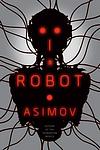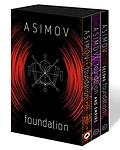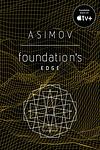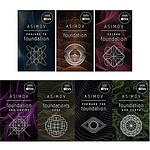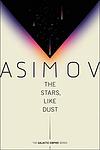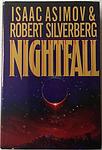Isaac Asimov
Isaac Asimov was a prolific writer and biochemistry professor, best known for his works of science fiction and popular science books. He was born on January 2, 1920, in Petrovichi, Russia, and his family emigrated to the United States when he was three years old. Asimov was a prolific author and is best known for his Foundation series, his Robot series, and the Galactic Empire series. He also wrote mysteries and fantasy, as well as a great amount of nonfiction. Asimov was a long-time member and Vice President of Mensa International, albeit he described some members as 'brain-proud and aggressive about their IQs'. He died on April 6, 1992, in New York City.
Books
This list of books are ONLY the books that have been ranked on the lists that are aggregated on this site. This is not a comprehensive list of all books by this author.
-
1. Foundation
This science fiction novel centers around Hari Seldon, a mathematician who has developed a branch of mathematics known as psychohistory. With it, he can predict the future on a large scale. Seldon foresees the imminent fall of the Galactic Empire, which encompasses the entire Milky Way, and a dark age lasting 30,000 years before a second great empire arises. To shorten this period of barbarism, he creates two Foundations at opposite ends of the galaxy. The book follows the first few centuries of the Foundation's existence, focusing on the scientists as they develop new technologies and negotiate with neighboring planets.
-
2. I, Robot
The book is a collection of nine short stories that revolve around the interaction of humans and robots. The stories are tied together by a framing narrative featuring a reporter interviewing a retiring robopsychologist, Dr. Susan Calvin. The stories explore the three "Laws of Robotics" and how they are interpreted and manipulated by humans and robots. Throughout the stories, the robots often end up behaving in unexpected ways due to their interpretation of these laws, leading to thought-provoking and often ironic outcomes.
-
3. The Caves Of Steel
"The Caves of Steel" is a science fiction novel set in a future where Earth is heavily populated and humans live in massive enclosed cities. The story follows a detective and his robot partner as they investigate a murder that could potentially spark a conflict between Earth's human population and the Spacers, a group of humans who live on other planets. As they delve deeper into the case, they uncover a complex conspiracy that challenges their beliefs about robots, humanity, and the future of their world.
-
4. Foundation And Empire
"Foundation And Empire" is a science fiction novel that continues the epic saga of a future Galactic Empire. As the Foundation, a group of scientists and scholars, grows in power and influence, they face a formidable enemy in the form of the Mule, a mutant with mind-controlling abilities. With the fate of the galaxy hanging in the balance, the Foundation must navigate political intrigue, military conflicts, and the enigmatic Seldon Plan to ensure their survival and preserve the knowledge of humanity.
-
5. Second Foundation
"Second Foundation" by Isaac Asimov is a science fiction novel set in a future galactic empire. The story follows a group of individuals who possess extraordinary mental abilities known as "psychohistory." As the empire crumbles, they work secretly to manipulate events and guide humanity towards a new era of peace. However, a dangerous adversary emerges, threatening to unravel their plans and plunge the galaxy into chaos. The novel delves into themes of power, control, and the unpredictable nature of human behavior.
-
6. Foundation's Edge
In this science fiction novel, the protagonist, Golan Trevize, is sent on a quest to discover the origins of the Foundation, a society established to preserve knowledge and culture in the galaxy. Alongside a scholar, Janov Pelorat, and a telepathic woman, Bliss, Trevize's journey leads them beyond the boundaries of the known galaxy to two secretive worlds: Gaia, a planet with a collective consciousness, and Earth, the long-forgotten origin planet of humanity. The novel explores themes of free will versus determinism, the role of individuality within a collective society, and the search for a balanced path to galactic harmony, all while questioning the validity of the Seldon Plan, a predictive model for the future of civilization.
-
7. Tales Of The Black Widowers
"Tales Of The Black Widowers" is a collection of mystery stories that revolve around a group of intellectuals known as the Black Widowers, who meet monthly for dinner and conversation. Each story presents a unique puzzle or enigma that the members attempt to solve, showcasing their wit, intelligence, and camaraderie. With a blend of humor, clever deductions, and unexpected twists, the book offers an entertaining and engaging read for mystery enthusiasts.
-
8. Prelude To Foundation
In this science fiction novel, a young mathematician arrives at the galactic empire's capital planet, hoping to present his revolutionary theory of psychohistory—a mathematical framework capable of predicting the future of large populations. While his ideas are initially met with skepticism, they soon attract the attention of the empire's political figures, who see potential for both control and upheaval. As the protagonist navigates the complex political landscape, he is pursued by various factions seeking to use his theory for their own ends. Along the way, he explores different cultures and subcultures of the sprawling empire, all while attempting to refine his nascent theory and understand the true implications of his work for the future of humanity.
-
9. The End Of Eternity
"The End of Eternity" is a thought-provoking science fiction novel that explores the concept of time travel and its consequences. Set in a future where a secretive organization called Eternity monitors and manipulates time to prevent catastrophic events, the story follows Andrew Harlan, a "Technician" tasked with altering the past to shape a more desirable future. However, when Harlan falls in love with a woman from the past, he begins to question the morality and ethics of his actions, ultimately leading to a mind-bending revelation about the true nature of Eternity.
-
10. The Gods Themselves
In a tale of science fiction that explores the consequences of unchecked technological advancement, the story unfolds across parallel universes, where a seemingly miraculous energy exchange between Earth and a parallel world inhabited by strange, energy-based life forms promises an endless supply of power. However, this gift comes at a potentially catastrophic cost. A physicist discovers that the exchange could lead to the destruction of both universes due to the differing physical laws governing them. The narrative weaves through the perspectives of humans and alien beings as they grapple with the moral and existential implications of their actions, ultimately questioning the very nature of progress and the ethical responsibilities of scientific discovery.
-
11. Foundation And Earth
In this science fiction novel, the continuation of an epic saga, the protagonist seeks the origins of humanity to save a vast galactic civilization. Journeying from world to world, the quest leads to the discovery of a planet called Earth, long shrouded in mystery and legend. Alongside complex characters and artificial intelligences, the narrative explores themes of power, history, and the search for a greater understanding of humanity's place in the cosmos. The story weaves together strands of politics, philosophy, and the future of human evolution, culminating in a profound revelation about the interconnected fate of the galaxy's myriad inhabitants and societies.
-
12. Forward The Foundation
The book is a science fiction novel that serves as a prequel to a renowned series, chronicling the life of a brilliant mathematician who develops a revolutionary theory of predicting the future on a large scale. Set against the backdrop of a decaying Galactic Empire, the protagonist works to refine his psychohistorical method in hopes of reducing the period of chaos and barbarism predicted to follow the Empire's inevitable fall. The narrative weaves through political intrigue, personal tragedy, and the relentless pursuit of knowledge, as the protagonist and his colleagues lay the groundwork for a foundation designed to preserve and expand human knowledge, and to serve as a beacon for a future enlightened civilization.
-
13. The Naked Sun
"The Naked Sun" is a science fiction novel set in a future where humans live on different planets. The story follows a detective who is sent to investigate a murder on a remote planet called Solaria, where the inhabitants live in complete isolation and have an extreme aversion to physical contact. As he delves deeper into the case, he discovers a complex web of secrets and a society that challenges his own beliefs and understanding of human nature.
-
14. Pebble In The Sky
In a future Earth, Joseph Schwartz, an elderly tailor from Chicago, is accidentally transported to a distant future where Earth is a radioactive wasteland. Struggling to adapt to this unfamiliar world, Schwartz becomes entangled in a political conspiracy and must navigate the complex dynamics between Earth's inhabitants and the powerful Galactic Empire. As he uncovers the truth about his own origins and the fate of humanity, Schwartz becomes a key player in determining the future of the galaxy.
-
15. The Stars, Like Dust
In a future where Earth is ruled by a tyrannical empire, Biron Farrill, a young student, finds himself caught in a web of political intrigue and rebellion. After his father is killed, Biron embarks on a journey to uncover the truth about his father's death and the secrets hidden within the stars. With the help of a resourceful woman named Artemisia, Biron must navigate a dangerous universe filled with spies, assassins, and hidden agendas. As he unravels the mysteries of his father's past, Biron becomes entangled in a plot that could change the course of history and determine the fate of humanity.
-
16. The Robots Of Dawn
In a futuristic world, a renowned detective is tasked with solving the mysterious murder of a renowned roboticist on the planet Aurora. As he delves into the complex web of political intrigue and personal vendettas, he must navigate the delicate balance between humans and robots, uncovering shocking secrets along the way. With time running out, the detective must unravel the truth before tensions between the two species escalate into a catastrophic conflict.
-
17. Nightfall
In a distant future, a planet experiences eternal daylight due to the presence of six suns. However, once every 2,049 years, a rare event known as "Nightfall" occurs, plunging the world into complete darkness. As scientists predict the imminent Nightfall, chaos ensues among the inhabitants who struggle to comprehend the unknown and cope with their fears. A group of scientists and scholars embarks on a desperate mission to preserve knowledge and find a way to survive the impending darkness. As the countdown to Nightfall begins, the characters are faced with existential questions about the nature of their existence and the fragility of human civilization.
-
18. The Mule
In this science fiction narrative, a mysterious and enigmatic figure known only as the Mule rises to power, disrupting the established order of a vast galactic empire that had been predicted to endure for thousands of years. The Mule possesses unprecedented psychic abilities, allowing him to manipulate emotions and bend individuals to his will, thus enabling him to conquer worlds and challenge the Seldon Plan—a long-term mathematical framework designed to guide humanity to a second empire. As the Mule's influence grows, a small group of protagonists embarks on a quest to understand and ultimately find a way to stop this unforeseen variable, whose very existence threatens to derail the course of human destiny as foreseen by the greatest psychohistorians of their time.

